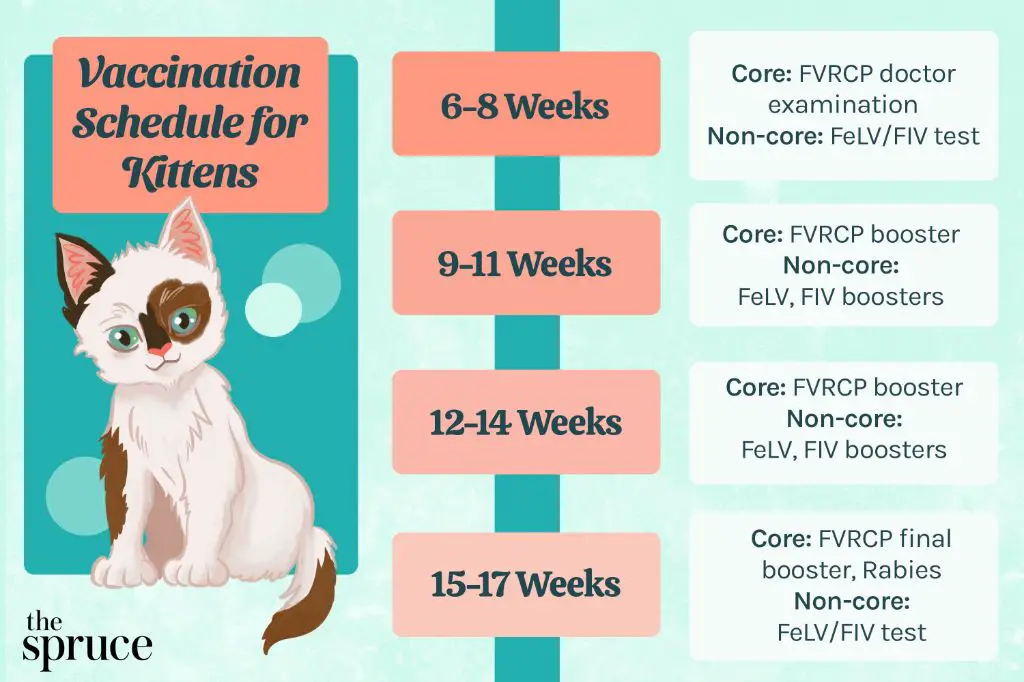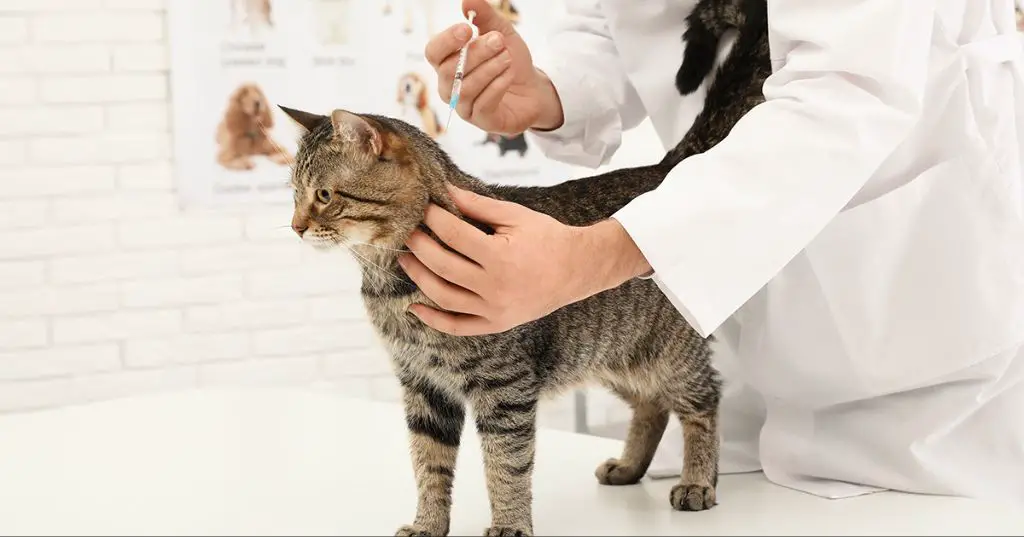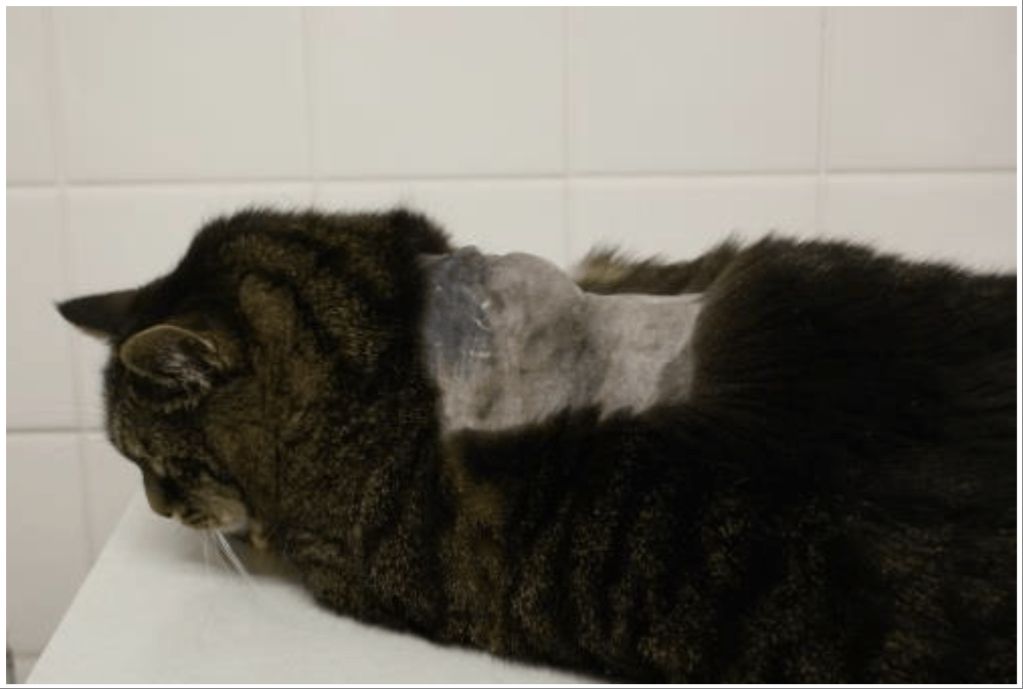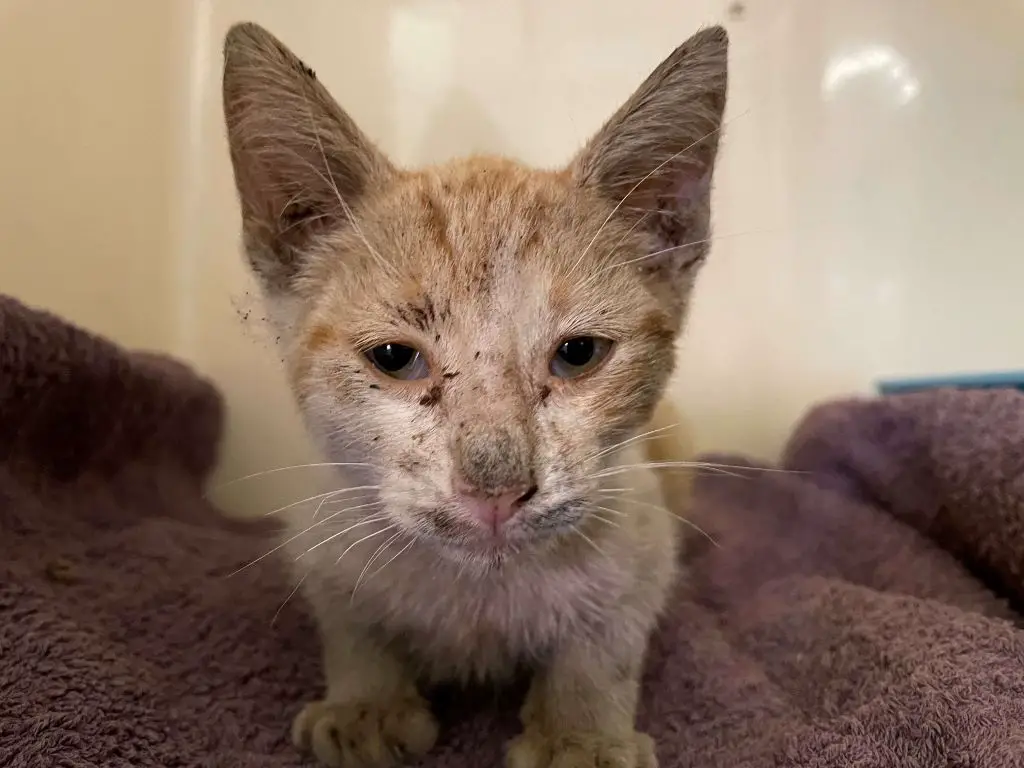Vaccinating cats is an important part of maintaining their health and preventing certain infectious diseases. Like any medication, cat vaccines do work by stimulating the immune system and can sometimes cause side effects in a small percentage of cats. However, the risks from these diseases far outweigh the small chance of vaccine reactions. Core cat vaccines help protect against panleukopenia, calicivirus, rhinotracheitis, and rabies. Other non-core vaccines may also be recommended based on lifestyle and risk factors. While mild side effects like lethargy and fever can occur, severe reactions are very rare. By understanding the benefits and risks of cat vaccines, owners can make informed decisions in consultation with their veterinarian.[1]
Common Cat Vaccines

There are some core vaccines that are recommended for most cats to protect them against common and serious diseases. These include:
- Rabies – The rabies vaccine protects against the rabies virus which attacks the central nervous system and is almost always fatal once symptoms appear. Rabies vaccination is required by law in most places. According to the AAHAA/AAFP Feline Vaccination Guidelines, the rabies vaccine is considered a core vaccine for all cats [1].
- FVRCP – This combination vaccine protects against three important viruses: feline viral rhinotracheitis (FVR), calicivirus (FCV), and panleukopenia (FPV). FVR and FCV cause upper respiratory infections while FPV causes a potentially fatal gastrointestinal disease [1][2].
- FeLV – The feline leukemia virus (FeLV) vaccine protects cats from the contagious retrovirus that suppresses the immune system. It is considered a core vaccine for kittens and cats under 1 year old [1][2].
These vaccines are called “core” because they protect against severe, life-threatening diseases that still commonly affect felines. Veterinarians recommend all pet cats receive these basic immunizations [2].
[1] Core Vaccines for Pet Cats
[2] Feline Vaccination Guidelines
Potential Mild Side Effects

Mild side effects like lethargy, reduced appetite, and low-grade fever are common after vaccination in cats and usually resolve within 24 hours. According to PetMD, the most common mild vaccine reactions in cats include:
- Slight soreness, tenderness, or swelling at the injection site
- Lethargy and fatigue
- Decreased appetite
- Slight fever under 103°F
These mild side effects are often seen within hours after vaccination and tend to resolve on their own within a day or two. They result from the immune system mounting a response to the modified antigens in the vaccine. According to the AVMA, most cats tolerate vaccinations well with only mild transient side effects.
While concerning for cat owners, lethargy, reduced appetite, and low fever after vaccination are common and expected immune responses. However, if these symptoms persist for over 48 hours or the cat seems severely ill, veterinary examination is recommended.
Potential Severe Side Effects

While most side effects from cat vaccines are mild, there are some more severe side effects that can occasionally occur. These include facial swelling, hives, vomiting, diarrhea, difficulty breathing, and collapse. According to PetMD, these reactions are classified as acute hypersensitivity reactions and happen within minutes to hours after vaccination. Anaphylaxis is the most severe hypersensitivity reaction. The signs include facial swelling, hives, vomiting, and difficulty breathing. This reaction requires immediate veterinary care.
Facial swelling is specifically the swelling of the head, face, or lips. Hives are welts on the skin that are very itchy. Vomiting and diarrhea can also occur after vaccination and tend to resolve on their own. However, if they persist for more than 24 hours, veterinary attention is warranted. Difficulty breathing and collapse indicates anaphylaxis and is a life-threatening reaction requiring emergency care.
While these severe vaccine reactions can occur in cats, PetMD states they are very rare. Precise estimates of frequency are not available. However, a study cited by the American Animal Hospital Association (AAHA) found anaphylaxis occurred in less than 1 in 10,000 vaccine doses across dogs and cats. Prompt veterinary treatment greatly improves the chance of survival from anaphylaxis. Be sure to monitor your cat closely for several hours after vaccination and seek emergency care if any concerning signs develop.
Source:
https://www.petmd.com/cat/general-health/possible-vaccine-reactions-cats
Mitigating Side Effects
Veterinarians strive to administer vaccines properly in order to minimize side effects. Vaccines can stimulate the immune system, and some cats may experience adverse reactions. To reduce the chances of reactions, vets follow guidelines on proper vaccination techniques and protocols.

One way vets mitigate side effects is by spreading out vaccines over multiple visits instead of giving them all at once. The 2020 AAHA/AAFP Feline Vaccination Guidelines state that cats receiving multiple vaccines should get no more than two or three at a visit, with at least 2-4 weeks between visits.
Vets may also pre-medicate cats before vaccines, especially those with a history of reactions. Pre-medication involves giving antihistamines, steroids, or other drugs prior to vaccination to minimize the immune response. The guidelines note that pre-medication has shown efficacy in lessening vaccine reactions in susceptible cats.
These evidence-based techniques allow vets to provide necessary protection while limiting side effects from cat vaccines.
Cat-Specific Risk Factors
A cat’s age, breed, and medical conditions can impact their risk of having an adverse reaction to vaccines. Kittens and senior cats may be more likely to experience side effects compared to adult cats. Purebred cats like Siamese and Persian breeds are also predisposed to reactions due to their genetics. Cats with conditions like feline leukemia virus or feline immunodeficiency virus can have more severe vaccine reactions. Underlying illnesses, especially those affecting the immune system, increase susceptibility as well. It’s important for cat owners to inform their vet about their pet’s medical history so proper precautions can be taken.
Reporting Side Effects
Pet owners should closely monitor their cats after receiving vaccinations to watch for any concerning side effects. According to the VCA Animal Hospitals, owners should monitor the injection site for swelling, redness, or pain, as well as check their cat’s overall wellbeing. Signs of fever, lethargy, loss of appetite, vomiting, diarrhea, or facial swelling could indicate an adverse reaction.
The American Animal Hospital Association recommends the “3-2-1” rule – monitor the injection site for 3 days for swelling, 2 weeks for lumps, and 1 month for facial swelling. Any concerning symptoms should prompt an immediate call to the veterinarian. Early reporting allows vets to provide supportive care and intervene if a reaction seems severe.
While side effects are usually mild, pet owners play a crucial role in identifying more dangerous reactions so vets can treat them quickly. Monitoring a cat after vaccination and alerting the vet about abnormalities can help keep cats healthy and safe.
Alternative Vaccine Schedules
Some veterinarians may recommend alternative vaccine schedules for cats that seem susceptible to vaccine reactions or side effects (1). This involves spacing out vaccine boosters over a longer timeline or reducing the number of vaccines given at once. For example, a vet may recommend giving the distemper vaccine and the rabies vaccine 3-4 weeks apart rather than on the same day. Or they may advise waiting a full year between core vaccine boosters instead of every 3 years (2). This gives the cat’s immune system more time to recover between stimuli. Modified schedules help reduce the likelihood of adverse events while still providing protective immunity against contagious diseases.
According to veterinary experts, alternative vaccine schedules are reasonable for overdue cats who need to restart their vaccine series (3). The vet will decide which vaccines to prioritize based on the cat’s lifestyle, risk factors, and local disease prevalence. They can administer single vaccines spaced weeks or months apart to avoid overwhelming the immune system. Once the cat is back on track with core vaccines, standard boosters can resume. However, the vet may continue to separate combo vaccines like FVRCP if the cat tolerated the modified schedule better.
It’s important to work closely with your veterinarian to determine if an alternative vaccine schedule makes sense for your cat. Your vet can tailor the timing and selection of vaccines to optimize immunity while minimizing reactions. Do not attempt to create your own schedule without professional guidance, as improper vaccination puts your cat at risk.
Sources:
(1) https://vcahospitals.com/know-your-pet/vaccines-for-cats
(2) https://todaysveterinarypractice.com/preventive-medicine/dog-cat-vaccination-recommendations/
The Importance of Vaccination
Despite the potential for mild side effects, vaccinating cats is crucial to protecting them from dangerous and potentially fatal infectious diseases. According to the Cornell Feline Health Center, common feline viruses such as panleukopenia virus, herpesvirus, calicivirus and rabies can lead to severe illness and even death in unvaccinated cats ([1]). While indoor cats are at lower risk, they can still contract diseases through contact with outdoor/stray cats or exposure during vet visits. The American Association of Feline Practitioners (AAFP) strongly recommends core vaccines for all kittens and a booster 1 year later, followed by boosters every 3 years for panleukopenia virus, herpesvirus and calicivirus ([2]). Vaccines help develop immunity and prevent outbreaks of infectious diseases that used to be common causes of feline illness and death prior to the development of vaccines. While no medical treatment is completely without risk, the well-documented benefits of timely vaccination vastly outweigh the small chance of side effects for most cats.
[1] https://www.vet.cornell.edu/departments-centers-and-institutes/cornell-feline-health-center/health-information/feline-health-topics/feline-vaccines-benefits-and-risks
[2] https://catfriendly.com/keep-your-cat-healthy/vaccines/
Conclusion
While cat vaccines can sometimes cause side effects, they are generally mild and temporary. The most common side effects include lethargy, reduced appetite, and low-grade fever. More severe reactions are quite rare. By staying informed and working closely with your veterinarian, side effects can often be managed successfully.
Ultimately, the dangers posed by infectious diseases far outweigh the small risk of vaccination in most cases. Getting your cat properly vaccinated protects their long-term health and wellbeing by preventing potentially fatal illnesses. Unless your veterinarian advises otherwise, following the standard vaccine protocol is important for your cat’s safety.
If you have any concerns about vaccinations, discuss them with your vet. They can help determine if an alternative schedule makes sense for your cat. Never skip vaccinations altogether, as the risks from diseases are far greater. Through routine wellness exams and staying vigilant for side effects, you can help protect your cat’s health for years to come.
